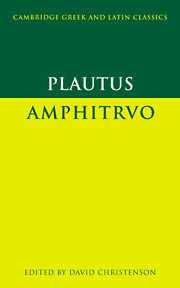Plautus’ Life and times
from Introduction
Published online by Cambridge University Press: 05 March 2013
Summary
The biographical tradition is notoriously suspect regarding Plautus. Much of what we hear ultimately descends from the Roman scholar Varro, who, working over a century after Plautus’ death, probably lacked reliable sources. The very dates given for Plautus’ birth (254 BC) and death (184 bc, the year of Cato’s censorship), though broadly accurate, are probably based on deduction rather than secure testimony. The few particulars given for his life read much more like fiction than fact. His alleged unsuccessful venture in trade abroad and subsequent employment in a mill in Rome recall stock situations of New Comedy. And Gellius’ report (NA 3.3.15) that Plautus wrote two plays while imprisoned for slander suspiciously recalls a similar event in the biography of Naevius. The designation of Sarsina in Umbria as Plautus’ native land may be only an inference drawn from an obscure jest at Mos. 770. Most suspicious of all is the playwright’s implausible name (Titus Maccius Plautus): it appears to be a comic formation modelled on the tria nomina used by prominent Roman families (and freedmen) in this period, with the transparent meaning ‘Phallus son of Clown the Mime-actor’. Each element suggests a form of (unscripted) native Italian comedy, and so we reasonably may suppose that Plautus began his theatrical career here. This also would accord with the plausible report that Plautus had made money in operis artificum scaenicorum (Gel. NA 3.3.14); ‘in the employment (or service) of stage-artisans’ is a vague description which could signify that he was a stage-worker, actor, writer of scripts, or even a producer.
- Type
- Chapter
- Information
- Plautus: Amphitruo , pp. 1 - 4Publisher: Cambridge University PressPrint publication year: 2000



